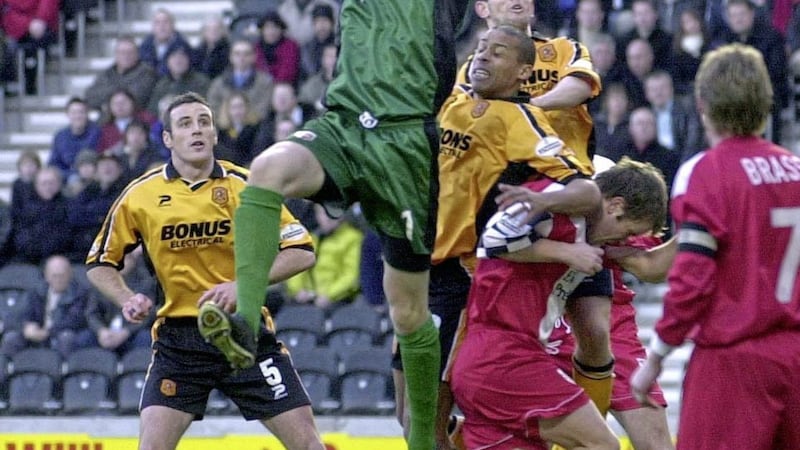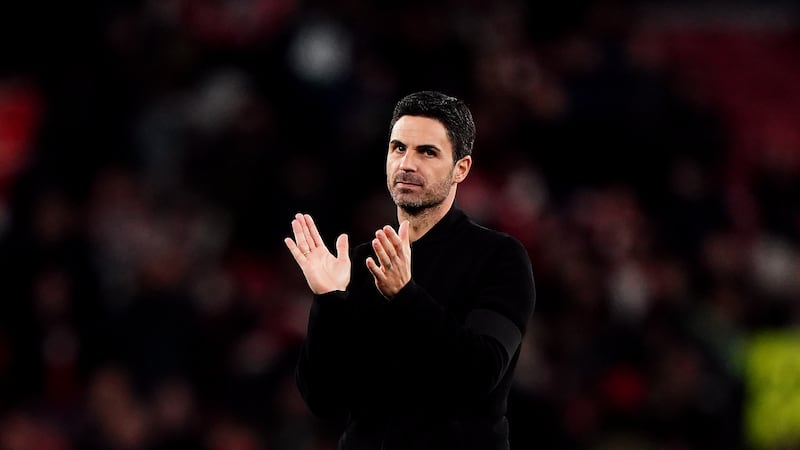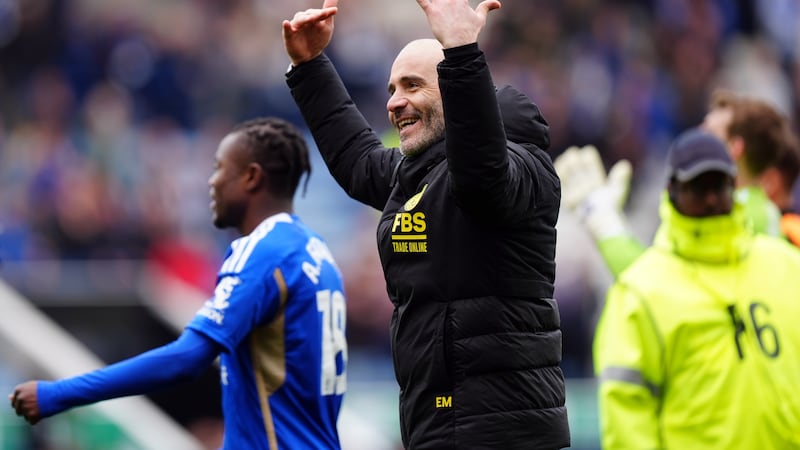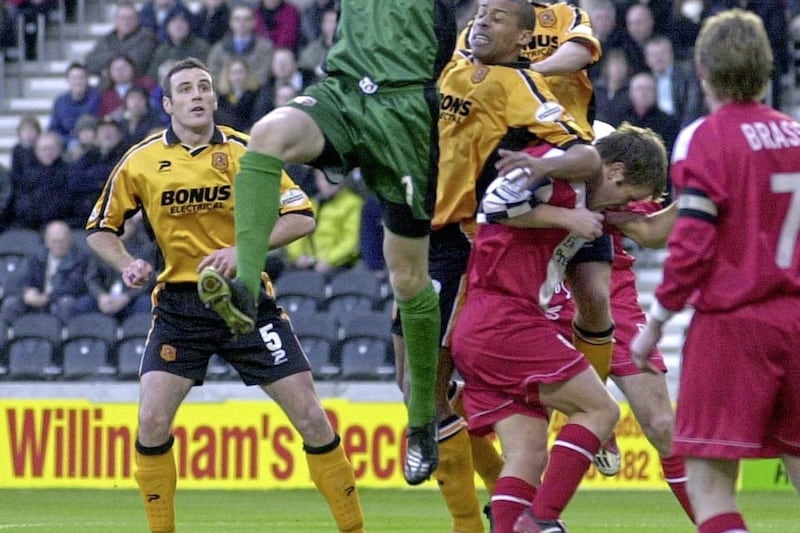Former Cliftonville, Sunderland and Northern Ireland international Michael Ingham has made a decent living out of professional football for over 20 years and is still going strong at Tadcaster Albion. He revisits his roots with Brendan Crossan and says he has worked for everything he got in football...
MICHAEL Ingham is standing in the grounds of the old Presbyterian church at the bottom of the Cliftonville Road.
‘Bring a goalkeeper’s jersey and a pair of gloves for the photograph, Michael’.
It’s the summer of 1998.
Cars rush by in the afternoon haze.
Ingham, Cliftonville Football Club’s new signing, turns up wearing a goalkeeper jersey and gloves.
Under the shade of trees in the church grounds he gets his picture taken for the local newspaper.
He’s just a gangly, easy-going kid with the world at his feet.
For a season we were team-mates at local Amateur League club Malachians.
Twenty-two years ago, I was cutting my teeth in sports journalism and Michael was moving up the football ladder at a blinding pace.
Just 18, he had the perfect physique for a goalkeeper - 6ft 4in, the wing span of an albatross and hands like shovels.
Cliftonville had just been crowned Irish League champions but Reds manager Marty Quinn had watched Ingham in the Amateur League and knew he was first team material.
By Christmas, the teenager had nailed down the number one spot at Solitude and was already attracting admiring glances from cross-channel clubs.
Before the end of his debut season he was in Peter Reid’s office with his mum signing for English Premiership club Sunderland.
**********
SPOOL forward to December 2019 and I’m sitting in the hallway of Sacred Heart Boys Primary School in north Belfast waiting to meet force-of-nature Principal Joanne Smyth to find out what her school has to offer P1 children.
While waiting you can’t miss Michael Ingham’s framed Sunderland jersey hanging on the wall in the hallway.
The caption reads: ‘Shirt worn by past pupil Michael Ingham, Sunderland v Man Utd at Old Trafford, 2001-02 season, FA Premier League. Presented to the school June 2002.’
This jersey, this frame and words are living proof that dreams can come true to working-class kids in socially and economically deprived areas of north Belfast.
It must stir the imagination of the pupils who pass through the school’s doors every day.
Born in Preston to Irish parents, Ingham moved to Belfast at a young age and lived with his mum a mere corner-kick away from Sacred Heart Primary School.
“My mum’s house backs onto the school. It was a 20-yard walk to school every day. A few years ago I was in Belfast visiting my mum and I was in a shop.
“An old lady comes up to me and says: ‘Hiya Michael, are you still playing the football?’
“I said: ‘Yes. Do you know my family?’ She replies: ‘Yes. I was the old lady that used to shout at you to stop kicking your ball against my wall. But I tell everybody now that you used to kick your ball off my wall!’”
Back in the 90s, Mr Donnelly was the school principal and a big GAA man. When young Ingham wasn’t playing soccer for Crumlin Star he was being ferried across town to play Gaelic football for Sarsfields by Mr Donnelly.
“I wasn’t brought up in the era of PlayStations, Xboxes, iPhones and social media – I had less distractions. I was playing sport seven days per week.”
“Mr Donnelly used to pick me up at Sacred Heart chapel and I went over to play for Sarsfields.”
**********
SO the big teenager is standing in Peter Reid’s office, towering over the former Everton and England international having resisted Ruud Gullit’s eleventh-hour attempt to sign him for cross-city rivals Newcastle United.
Reid grabs his new goalkeeper by the arm, as if to test the merchandise, and says: ‘You’ll do for me, big man.’
Speaking at his home outside York, Ingham, now 40, recalls: “I flew over to sign the contract. I was a bit naïve as a young lad because I didn’t really know what way the professional system worked. I did my medical at the end of May and the ‘Gaffer’, Peter Reid, says to me: ‘I’ll see you July 2nd, big man.’”
But there was a minor hitch as mother and son turned to each other.
‘What’s up?’ Reid asked.
‘No, it's okay,’ Ingham replied.
‘No, tell me, what’s up,’ Reid insisted.
‘We’ve got a family holiday booked,” Ingham meekly replied.
‘When are you back?’
‘July 14.’
‘Enjoy your holiday and I’ll see you on the 15th.’
“So he gave me an extended break with my family before I’d even started,” Ingham says.
On his first day of training – July 15, 1999 – Ingham’s flight is delayed and he’s running late.
The young ‘keeper is in a flap when he arrives at the training ground.
‘Don’t worry about it,” his manager says. ‘You’re fine, just get yourself ready. We’re going to ease you in.’
‘Cheers, Peter,’ Ingham says.
Big mistake.
‘You don’t call me that over here. You call me ‘Gaffer’.’
Rule number one – ‘Gaffer’ - was learned quickly.
“It was because I called my Cliftonville manager, ‘Marty’ - Marty Quinn. I realised that I was in the big world now and it was a case of getting my ass in gear.
“But I loved Peter Reid. He looked after me at Sunderland. There were times I wasn’t playing but he always looked out for me. He’d pull me into his office and say things like: ‘Don’t be beating yourself up. You’re here for the long-term, not the short-term.’”
At a club like Sunderland that was perpetually in survival mode in the English Premiership, first team opportunities were always going to be few and far between.
A rookie from the part-time Irish League, Ingham was competing with a glut of experienced goalkeepers.
At one point, the Black Cats had four international keepers on their books: Tommy Sorenson (Denmark), Jurgen Macho (Austria), Martin Poom (Estonia) and Tommy Mhyre (Norway).
Within three months of arriving at Sunderland, Ingham asked to go out on loan.
With over 20 years of experience of professional football under his belt, Ingham says: “The biggest difference now with young lads is they’re happy to stay in the U23s at a Premier League club and get another contract, whereas I wasn’t happy with that. I was knocking the manager’s door asking to go out on loan. Within three months I was down at Carlisle. I went all over the country to get games. That’s what got me the career that I had.”
Ingham was on the road for large chunks of his career: Carlisle United, Stoke City, Stockport, Darlington and even a short loan spell back at Cliftonville before further further stints in the lower leagues with Doncaster, York City and Wrexham.
He never viewed loan spells as anything other than a stepping stone to better things.
“Reidy got sacked and Howard Wilkinson came in and I’d just signed a four-year deal, and his first signing was Mark Poom,” Ingham remembers.
“So I’d gone from third choice to fourth choice. I rapped the manager’s door and he said: ‘How old are you?’ I said: ‘I’m 21.’
“He said: ‘My goalkeepers need to be 25, 26, so I’m going to send you out on loan for three years.’
“I went out on loan to York and then Wilkinson got sacked. Mick McCarthy came in and I was in Belfast at the time.
“Instead of going to York’s training, I went into Sunderland’s training and I was running around the training ground and Mick pulled me over.
“I told him there were a few clubs interested in me and I’d like to go, and he said: ‘You’re going no-where. You’re on the bench next year in the Championship.’
“That’s all I needed to hear. I was back being number two. I liked McCarthy. Just a little bit towards the end when there was a young lad called Ben Alnwick coming through the ranks, he was being earmarked as the next big thing.
“We got to the FA Cup semi-final and lost to Millwall.
“Mick wanted to me to go on loan to Wrexham and didn’t want me sitting on the bench. He needed to get me out to push Ben through.”
McCarthy assured the frustrated Ingham that the club would offer him another contract, but approaching six years at the Stadium of Light, he decided to move on.
When he signed for Wrexham in 2005 he was firmly on Northern Ireland’s radar under Lawrie Sanchez and made his senior international debut against Germany in a friendly at Windsor Park.
“Some of the abuse I got at Windsor playing for Cliftonville was ridiculous,” Ingham says. “I remember playing a semi-final of the Irish Cup and getting pelted by coins and mars bars.”
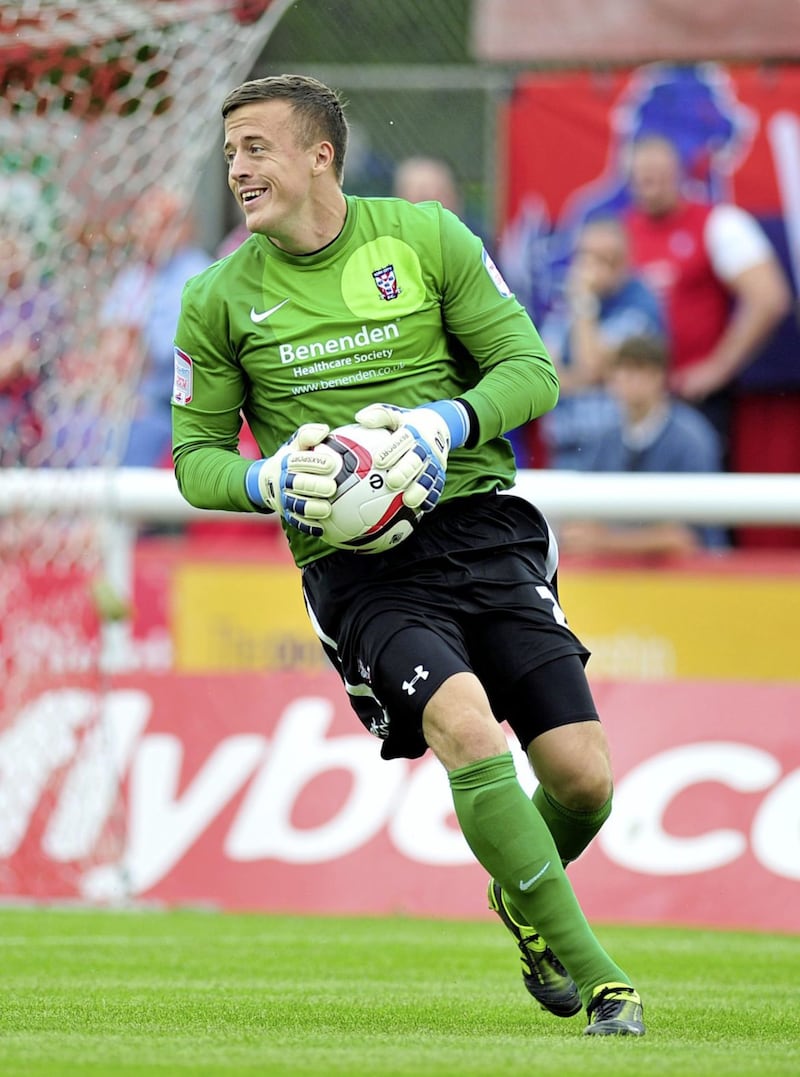
But when he made a second half substitute appearance against the Germans, Ingham was overwhelmed by the reception.
“I was a bit apprehensive as to what way it was going to go but in the exact same goal-mouth I ended up getting one of the biggest roars of the night. I remember thinking: ‘What’s this for?’ I felt at home straight away.”
*********
MANY young footballers in Ingham’s shoes would have given up on a career in professional football.
They mightn’t have hung around for yet another loan spell. Feeling demoralised by the sharper edges of their chosen profession, the vast majority might have called it quits and returned home.
But all the loan spells had toughened Ingham and prepared him for the best nine years of his career at York City (2008 to 2016).
“My first contract at Sunderland was £350 a week.
“People say to me: ‘You must’ve made big bucks.’
“I never made big money. I just wanted to play football. No respect to anybody that went back home and played Irish League but I just felt, if I go back, I’ve failed in England.
“And I didn’t want to go back… You’d arrive at a new club and you’re lying in bed in a B&B and you’re thinking: ‘I’ve got this for a month’
“You’ve got a small TV - back then there were no smart TVs - you’re watching BBC1, BBC2, ITV and Channel 4.
“You’re sitting there on your own. You go out to the supermarket to get something to eat because you’ve to feed yourself. You’d only get breakfast in your digs...
“But I travelled around on loan and made a name for myself and I got contracts in the lower leagues."
He adds: “My best memories were when I was at York City, and that was the lowest team I played for [Conference Premier].
He played at Wembley four times and won the FA Trophy and the Conference play-off final there in the space of eight days in 2012.
**********
ENDINGS are rarely how you’d write them. Sometimes that aspect of your fate is taken completely out of your hands.
Your face no longer fits. The new manager wants to go a different road. During his nine years at York City, Ingham had achieved cult status.
By the time he’d reached his mid-30s and new manager Russ Wilcox arrived at the club, it was always going to end in acrimony.
‘We’re going to give you a 50 per cent pay cut,’ was one of the first things Wilcox said to Ingham, who'd clocked up over 300 appearances for the north Yorkshire club and kept over 100 clean sheets.
“I got angry because he knew my daughter [Indie] was due to be born a week later, he knew my home situation. He knew I couldn’t sign for anyone else. I was 35 when my first child came along.
‘You know I’m going to sign this but I’m hoping you get sacked in a couple of months,’ Ingham told Wilcox.
A week later Wilcox lost his job and was replaced by former Celtic legend Jackie McNamara.
In McNamara, Ingham had found a more compassionate manager – but the purse strings had already been set.
“Jackie said to me: ‘What the last manager did to you was wrong. I can’t do anything at the moment because there is no room in the budget.
“I said to Jackie: ‘It’s not your problem. I’ll give you 110 per cent while I’m here.’”
But when a mooted testimonial at the club never materialised Ingham upped sticks and left and signed for local Northern Premier League Tadcaster Albion where he remains today.
He celebrated his 40th birthday last month and was voted Players’ Player of the Year in Albion’s truncated Covid19 season.
While still striving to be the best that he can be and making light of the creeping years for Tadcaster, Ingham also coaches young academy players at a local university. (He holds a Uefa ‘A’ licence qualification).
“I work with a lot of American players and they’d ask about my upbringing. They don’t understand how tough it was at times. I’d a school friend whose father was shot at the bottom of my street and there was an attempt to shoot my grandad who was 67 at the time.
“They said he was a driver for Sinn Fein, but he never drove a car in his life. I have been affected by my childhood in different ways.
“I tell the students I’ve seen rubber bullets bouncing down the road and I’ve heard gunshots and bombs go off. I go back now with my girlfriend and Indie and my English friends and they absolutely love Belfast, it’s a beautiful city.”
His accent dances throughout the interview. Strong northern English tones one minute before the Belfast in him comes racing through.
“I classify Belfast as home,” he adds. “Obviously I’ve a little five-year-old and England is my long-term home now. The only time I got homesick was when I left Cliftonville to go to Sunderland.
“It was a big shock for me. It was the Premier League, a big stadium, big names. Sometimes I thought: ‘Am I good enough to be here?’ But I just got my head down and worked hard and the homesickness quickly went away.
“Football has given me the best times of my life, great memories. It’s been tough. People say: ‘You’ve been lucky to live it.’
“I don’t think I've been lucky. I’ve grafted my backside off and I think I’ve done it the hard way. I didn’t have the Porsche’s or mansions – I just wanted to play football.”
He was able to pay off the remainder of the mortgage on his mother’s house on Sylvan Street and is coming home soon so that Indie can be reunited with her doting grandmother for a few days.
If he could rewind the clock he says he “probably wouldn’t have worried as much” during his early career but he regrets nothing.
Michael Ingham is a glowing parable for dreaming big and working hard. But you can’t have one without the other.
The kids of Sacred Heart Primary School should know this every time they cast an admiring eye at the framed jersey in the hallway.
It tells them that they too can dream as big and as wild as they want. That's what Michael Ingham did...
